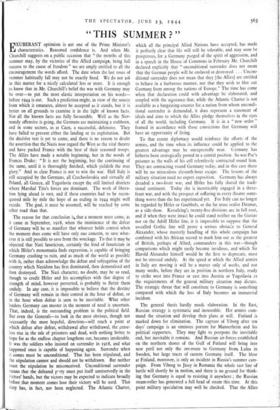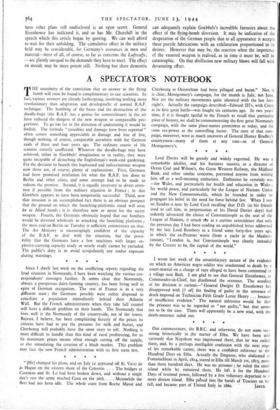"THIS SUMMER ? "
EXUBERANT optimism is not one of the Prime Minister's characteristics. Reasoned confidence is. And when Mr. Churchill suggests on a public occasion that "the months of this summer may, by the victories of this Allied campaign, bring full success to the cause of freedom" we are amply entitled to all the encouragement the words afford. The date when the last roses of summer habitually fall may not be exactly fixed. We do not ask in this matter for a nicely calculated less or more. It is enough to know that in Mr. Churchill's belief the war with Germany may be over—to put the most elastic interpretation on his words— before 1944 is out. Such a prediction might, in view of the source, from which it emanates, almost be accepted as it stands, but it is better on all grounds to examine it in the light of known facts. Not all the known facts are fully favourable. Well as the Nor- mandy offensive is going, the Germans are maintaining a stubborn, and in some sectors, as at Caen, a successful, defensive. They have failed to prevent either the landing or its exploitation. But the decisive test is yet to come, and there is no reason to doubt the assertion that the Nazis now regard the West as the vital theatre and have packed France with the best of their seasoned troops. The Allies have made a notable beginning, but in the words of Francis Drake: "It is not the beginning, but the continuing of the same, until it is thoroughly finished, which yieldeth the true glory." And to dear France is not to win the war. Half Italy is still occupied by the Germans, all Czechoslovakia and virtually all Poland, all Greece, all Yugoslavia except the still limited districts where Marshal Tito's forces are dominant. The work of libera- tion lying ahead is vast, and if these countries had to be ream- quered mile by mile the hope of an ending in 1944 might well recede. The goal, it must be assumed, will be reached by some other road than that.
The reason for that conclusion is, that a moment must come, as it came in September, 1918, when the imminence of the defeat of Germany will be so manifest that whoever holds control when the moment does come will have only one concern, to save what- ever it is still possible to save from the wreckage. To that it may be objected that Nazi fanaticism, certainly the kind of fanaticism in which Hitler's monomania finds expression, is capable of bringing Germany crashing- to ruin, and as much of the world as possible with it, rather than acknowledge the defeat and subjugation of the country which Nazidom has first dominated, then demoralised and then destroyed. The Nazi character, no doubt, may be so read, though to credit Hitler and his accomplices with that degree of strength of mind, however perverted, is probably to flatter them unduly. In any case, it is impossible to believe that the destiny of Germany will remain in their control in the hour of defeat, or in the hour when defeat is seen to be inevitable. What other leaders Germany can muster in the moment of need is uncertain. That, indeed, is the outstanding problem in the political field. But even the General.—to look in the most obvious, though not necessarily the most hopeful, direction—will reach a point at which defeat after defeat, withdrawal after withdrawal, the gease- less rise in the tale of prisoners and dead, with nothing better to hope for as the endless chapter lengthens out, becomes intolerable. It was the soldiers who insisted on surrender in 1918, and what happened once is capable of happening again. Surrender when it comes must be unconditional. That has been stipulated, and the stipulation cannot and should not be withdrawn. But neither must the stipulation be misconceived. Unconditional surrender means that the defeated p^rty must put itself unreservedly in the victors' hands, but the victors may be expected to indicate broadly before that moment comes how their victory will be used. That duty has, in fact, not been neglected. The Atlantic Charter, which all the principal Allied Nations have accepted, has made it perfectly clear that life will still be tolerable, and may soon be prosperous, for a Germany purged of the spirit of aggression, and in a speech in the House of Commons in February Mr. Churchill declared explicitly that "unconditional surrender does not mean that the German people will be enslaved or destroyed. . . . Uncon- ditional surrender does not mean that they [the Allies] are entitled to behave in a barbarous manner, nor that they wish to blot out Germany from among the nations of Europe." The time has come when that declaration could with advantage be elaborated, and coupled with the avurance that, while the Atlantic Charter is not available as a bargaining-counter for a nation from whom uncondi- tional surrender is demanded, it does represent a statement of ideals and aims to which the Allies pledge themselves in the eyes of all the world, including Germany. It is in a "new order" framed in accordance with those convictions that Germany will have an opportunity of living.
To that extent diplomacy would reinforce the efforts of the armies, and the time when its influence could be applied to the greatest advantage may be unexpectedly near. Germany has hitherto been strategically posted in a central position. So was Poe's prisoner as the walls of his cell relentlessly contracted round him. They are contracting round Germany today, and in this case there will be no miraculous eleventh-hour escape. The lessons of the military situation need no expert exposition. Germany has always dreaded a two-front war, and Hitler has fully shared the tradi- tional sentiment. Today she is inextricably engaged in a three- front war, and with the prospect of suffering in every theatre some- thing worse than she has experienced yet. For Italy can no longer be regarded by Hitler or Goebbels, or the far more realist Dittmar, as a side-show. Kesselring's twenty-five divisions are in full rout, and if when they were intact he could stand neither on the Gustav nor on the Adolf Hitler line, it is impossible to suppose that the so-called Gothic line will prove a serious obstac:e- to General Alexander, whose masterly handling of this whole campaign has combined with his African record to mark him out as the greatest of British, perhaps of Allied, commanders in this war—though comparisons which might easily become invidious, and which Sir Harold Alexander himself would be the first to deprecate, must not be stressed unduly. At the speed at which the Allied armies in Italy are moving it will be a matter only of weeks, and not many weeks, before they are in position in northern Italy, ready to strike west into France or east into Austria or Yugoslavia as the requirements of the general military situation may dictate. The strategic threat that will constitute to Germany is something compared with which the loss of Italy becomes an immaterial incident.
The general thesis hardly needs elaboration. hi the East, Russian strategy is systematic and inexorable. Her armies com- mand the situation and develop their plans at will. Finland is marked down for elimination. The capture of Viborg after ten days' campaign is an ominous portent for Mannerheim and his political supporters. They may fight to postpone the inevitable end, but inevitable it remains. And Russian air-forces established on the northern shores of the Gulf of Finland will bring into new peril not only the ore-route to Germany from. Lulea in Sweden, but large tracts of eastern Germany itself. The blow at Finland, moreover, is only an incident in Russia's summer cam- paign. From Viborg to Jassy in Rumania the whole vast line of battle will shortly be in motion, and there is no ground for think- ing that Germany is equal to resisting it anywhere ; the Russian steam-roller has generated a full head of steam this time. At this point military speculation may well be checked. That the Allies have other plans still undisclosed is an open secret. General Eisenhower has indicated it, and so has Mr. Churchill in the speech which this article began by quoting. We can well afford to wait for their unfolding. The cumulative effect in the militaty field may be considerable, for Germany's resources in men and material—most of all, of course, so far as concerns the Luftwaffe, —arc plainly unequal to the demands they have to meet. The effect on morale may be more potent still. Nothing but sheer dementia can adequately explain Goebbels's incredible fantasies about the effect of the flying-bomb diversion. It may be indicative of the desperation of the German people that to all appearance it accepts these puerile fabrications with an exhilaration proportioned to its desires. However that may be, the reaction when the impotence Of the vaunted weapon is realised, as in time it must be, will be catastrophic. On that disillusion new military blows will fall with devastating effect.























 Previous page
Previous page